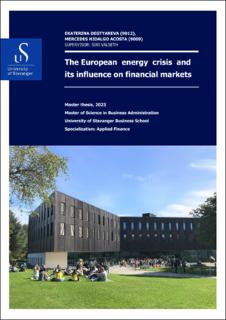| dc.description.abstract | The last two global events that shook the economy of Europe, namely the COVID-19 pandemic and Russian invasion of Ukraine, served as motivation to apply financial knowledge and research the relationships between the current energy crisis and financial markets. Earlier studies were mainly focused on the relationships between oil prices and their impact on the macroeconomy and financial markets. Gas, in turn, did not receive as much attention due to European companies entering into long-term gas supply contracts and hedging their risks. As a result, the disruption of these supplies caused an unprecedented energy crisis, the effects of which are investigated in this thesis.
This study analyzes the impact of energy price movements on European stock markets from 2008 to 2023 using monthly data extracted from REFINITIV and FRED economic databases. We used for analysis the VAR model, which is a widely applied empirical tool for financial modeling, as well as the DLM approach. The models include eight European stock market INDEXes, GAS, OIL, COAL, IPI, and IR.
According to the results, stock markets currently show low rationality in the short term, which means that INDEXes do not always reflect the true value of companies and that the volatility of stocks is mainly linked to speculation, emotional decision-making, and incomplete information. Depending on the specificities of the economies of the analyzed countries and their dependence on gas imports, financial markets react differently to GAS shocks. OIL is currently less significant than GAS due to the extraordinary GAS shock. We proved the impact of GAS on INDEXes in Germany and France through a direct channel due to a high level of dependence on the import of fossil fuels, and in Norway and Italy through an indirect (monetary) channel. | |
